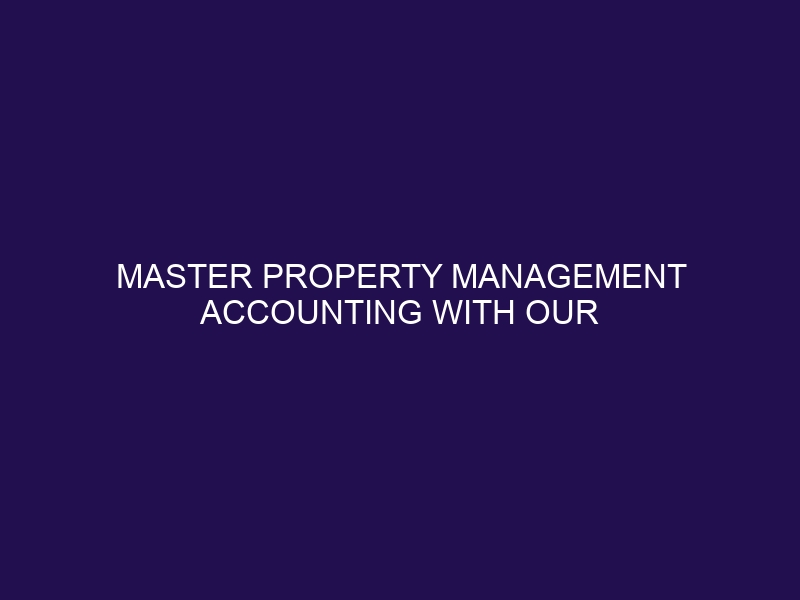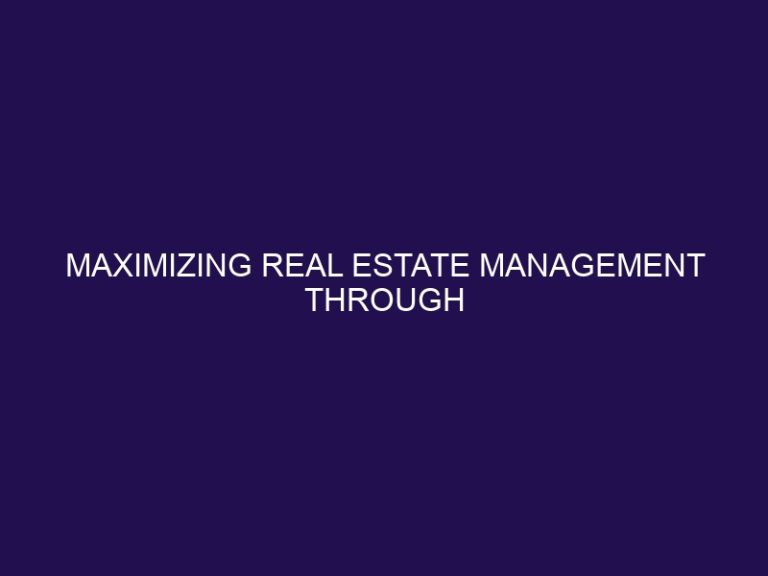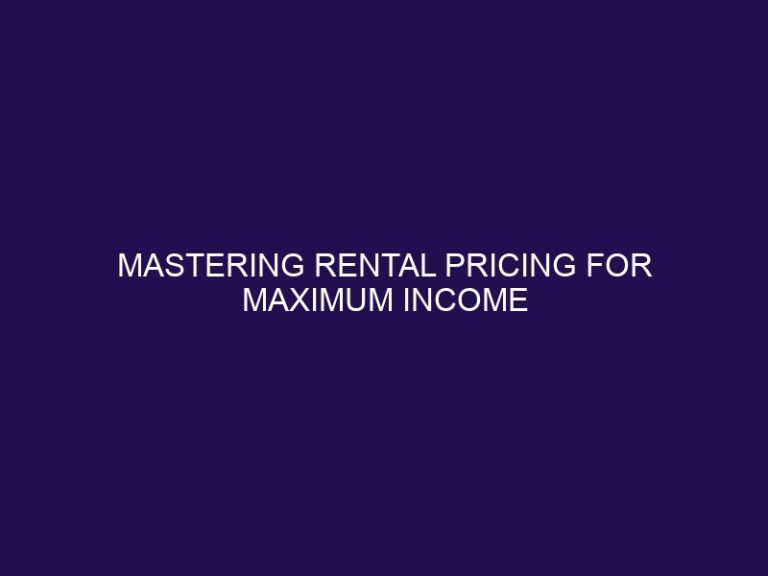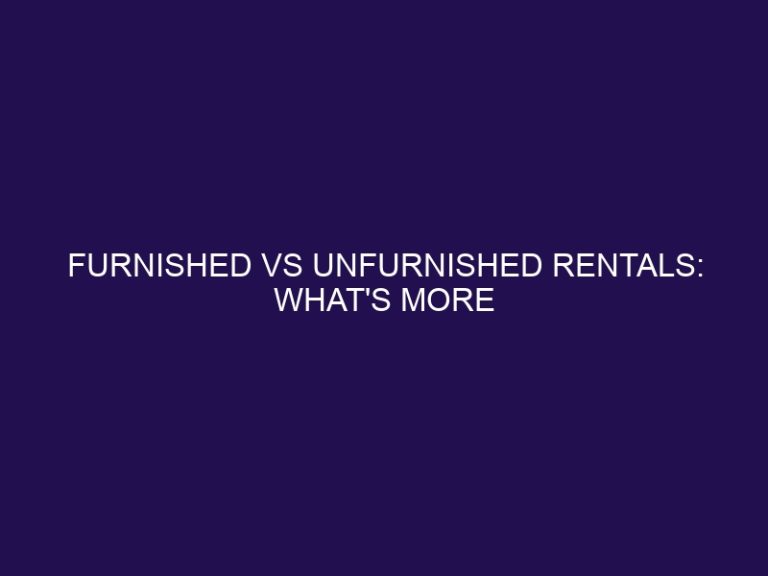Master Property Management Accounting with Our Ultimate Guide
Welcome to the ultimate guide to property management accounting! In the world of property management, accounting plays a crucial role in ensuring the financial health and success of your business. From tracking rental income and expenses to managing property taxes and maintenance costs, effective accounting practices are essential for staying organized and making informed financial decisions.
In this comprehensive guide, we will cover everything you need to know about property management accounting, including best practices, common challenges, and practical tips for streamlining your financial processes. Whether you’re a seasoned property manager or just getting started in the industry, this article will provide valuable insights to help you navigate the complex world of property management accounting with confidence. So, let’s dive in and unlock the secrets to mastering property management accounting!
Key Takeaways:
Introduction to Property Management and Accounting
Property management and accounting involve the oversight and financial tracking of real estate assets, including the management of rental income, expenses, and compliance with IRS regulations and financial standards.
This multifaceted discipline encompasses tasks such as lease agreements, property maintenance, and tenant relations. It requires meticulous documentation and reporting to ensure accurate expense tracking. Comprehensive understanding of tax compliance and financial regulations is essential to avoid penalties and ensure efficient financial governance. Effective property management and accounting demand a diverse skill set, blending financial acumen with real estate expertise.
Expenses and Cash Flow Management
Effective property management involves meticulous tracking of expenses, ensuring optimal cash flow management, and adhering to financial accounting standards set by FASB.
To achieve efficient expense management within property management, it is imperative to implement cost optimization strategies that focus on reducing unnecessary expenses without compromising property quality.
One approach for cost optimization entails conducting a comprehensive cash flow analysis, identifying areas with potential cost-savings, and re-allocating resources to maximize financial performance.
Integrating financial accounting standards not only ensures regulatory compliance but also provides a structured framework for accurate expense reporting, facilitating knowledge-based decision making and long-term financial sustainability within property management.
Rental Income and Tax Deductions
Managing rental income involves navigating tax implications and maximizing deductions within the regulatory framework set by the IRS and real estate transactions.
Understanding the complexities of rental income management is essential for property owners and landlords. It requires adherence to IRS regulations while ensuring that one optimizes the available deductions to minimize tax liability. To achieve this, individuals need to track and categorize expenses related to the rental property, such as maintenance, repairs, utilities, and property management fees.
Staying updated with tax laws and regulations specific to rental income is crucial to remain compliant and avoid potential penalties. Owners must also carefully document rental income, expenses, and profits to accurately report their financial transactions.
Tenant Records and Financial Reporting
Maintaining comprehensive tenant records is pivotal for accurate financial reporting and ensuring the smooth operation of property management businesses.
Tenant record-keeping serves as a fundamental aspect of maintaining the financial health and stability of property management businesses. It enables property managers to track rental income, monitor lease terms, and manage expenses efficiently. These records play a crucial role in budgeting, forecasting, and assessing the overall performance of the property portfolio. Thorough tenant records help in complying with regulatory requirements and legal obligations, safeguarding the business against potential disputes and liabilities.
Frequently Asked Questions
What is Property Management Accounting?
Property Management Accounting is a subset of accounting that focuses on managing financial activities related to real estate properties. This includes tracking income and expenses, creating financial reports, and ensuring compliance with tax regulations.
What does “The Ultimate Guide to Property Management Accounting” cover?
This guide covers everything you need to know about managing the financial aspect of property management. It includes topics such as setting up a chart of accounts, budgeting, rent collection, and analyzing financial statements.
Why is Property Management Accounting important?
Effective property management accounting is crucial for the success of any real estate investment. It helps property owners and managers make informed decisions, track expenses, and maintain accurate financial records for tax purposes.
Do I need to be a certified accountant to manage property finances?
While it is beneficial to have a background in accounting, it is not necessary to be a certified accountant to manage property finances. With the right resources and knowledge, anyone can learn the basics of property management accounting.
What are some common challenges in Property Management Accounting?
Some common challenges in property management accounting include accurately tracking expenses, handling rent collection and delinquencies, and ensuring compliance with tax regulations. This guide provides tips and solutions to overcome these challenges.
How can “The Ultimate Guide to Property Management Accounting” benefit property managers?
This guide is a valuable resource for property managers as it provides a comprehensive understanding of the financial aspect of property management. It can help managers streamline their accounting processes, make informed financial decisions, and improve the overall profitability of their properties.







